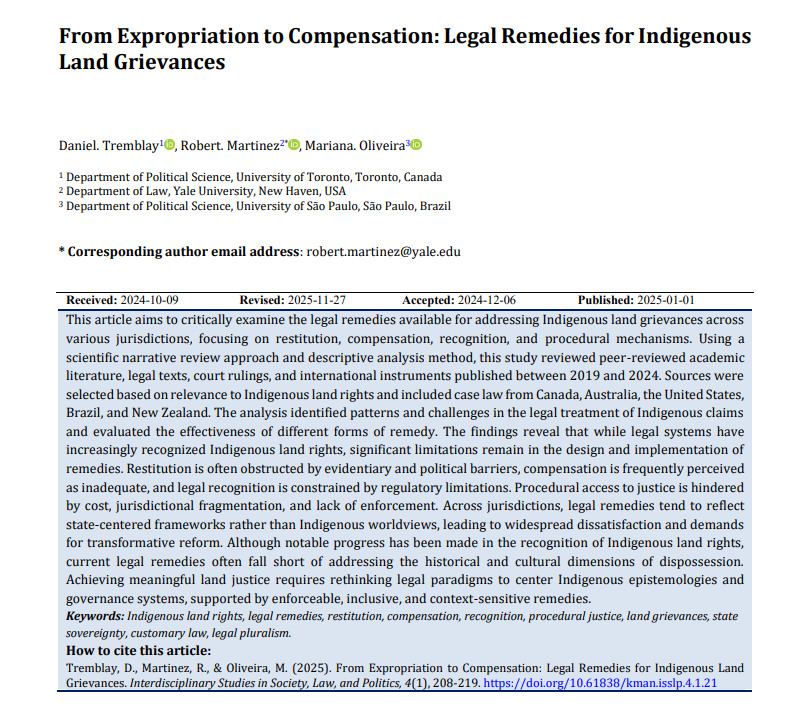From Expropriation to Compensation: Legal Remedies for Indigenous Land Grievances
Keywords:
Indigenous land rights, legal remedies, restitution, compensation, recognition, procedural justice, land grievances, state sovereignty, customary law, legal pluralismAbstract
This article aims to critically examine the legal remedies available for addressing Indigenous land grievances across
various jurisdictions, focusing on restitution, compensation, recognition, and procedural mechanisms. Using a
scientific narrative review approach and descriptive analysis method, this study reviewed peer-reviewed academic
literature, legal texts, court rulings, and international instruments published between 2019 and 2024. Sources were
selected based on relevance to Indigenous land rights and included case law from Canada, Australia, the United States,
Brazil, and New Zealand. The analysis identified patterns and challenges in the legal treatment of Indigenous claims
and evaluated the effectiveness of different forms of remedy. The findings reveal that while legal systems have
increasingly recognized Indigenous land rights, significant limitations remain in the design and implementation of
remedies. Restitution is often obstructed by evidentiary and political barriers, compensation is frequently perceived
as inadequate, and legal recognition is constrained by regulatory limitations. Procedural access to justice is hindered
by cost, jurisdictional fragmentation, and lack of enforcement. Across jurisdictions, legal remedies tend to reflect
state-centered frameworks rather than Indigenous worldviews, leading to widespread dissatisfaction and demands
for transformative reform. Although notable progress has been made in the recognition of Indigenous land rights,
current legal remedies often fall short of addressing the historical and cultural dimensions of dispossession.
Achieving meaningful land justice requires rethinking legal paradigms to center Indigenous epistemologies and
governance systems, supported by enforceable, inclusive, and context-sensitive remedies.
Downloads
References
Almeida, B. (2021). The Law and Its Limits: Land Grievances, Wicked Problems, and Transitional Justice in Timor-Leste. International Journal of Transitional Justice, 15(1), 128-147. https://doi.org/10.1093/ijtj/ijaa030
Averyanova, N. N., Anisimov, A., & Komkova, G. N. (2021). Debatable Issues on Land Rights Protection of Indigenous Small-Numbered Peoples of the North, Siberia and the Far East of the Russian Federation. International Journal on Minority and Group Rights, 28(2), 331-350. https://doi.org/10.1163/15718115-bja10024
Aziz, G. A., Suhariningsih, S., & Kawuryan, E. S. (2024a). The Right of Management Originating From Indigenous People Ulayat Land: A Curse or a Solution? Negrei Academic Journal of Law and Governance, 4(2), 185-202. https://doi.org/10.29240/negrei.v4i2.11405
Aziz, G. A., Suhariningsih, S., & Kawuryan, E. S. (2024b). The Right of Management Originating From Indigenous People Ulayat Land: Determinant of Solution. International Journal of Business Law and Education, 5(2), 2177-2184. https://doi.org/10.56442/ijble.v5i2.804
Blatman, N. (2019). Reciprocal Repossession: Property as Land in Urban Australia. Antipode, 51(5), 1395-1415. https://doi.org/10.1111/anti.12570
Chavez, S. (2024). Understanding Indigenous Land Rights and Dispossession. TTHR, 15(2), 30-40. https://doi.org/10.46787/tthr.v15i2.4247
Claridge, L., & Kobei, D. (2023). Protected Areas, Indigenous Rights and Land Restitution: The Ogiek Judgment of the African Court of Human and Peoples’ Rights and Community Land Protection in Kenya. Oryx, 57(3), 313-324. https://doi.org/10.1017/s0030605322000989
Diana, D., & Aswari, A. (2024). Legal Arrangements and Remedies for Abandoned Land: A Normative Study. Golden Ratio of Law and Social Policy Review, 2(2), 23-33. https://doi.org/10.52970/grlspr.v2i2.293
Eshemo-Omo, I. P., & Obieshi, E. (2024). A Comparative Analysis of Non-Judicial Remedies for Administrative Acts in Nigeria and the United Kingdom. Agora International Journal of Juridical Sciences, 18(2), 183-196. https://doi.org/10.15837/aijjs.v18i2.6989
Espinosa, Y. B., & Camacho, M. T. S. (2024). The Dispute for Other Legal Knowledges in the Judicial Field: Indigenous Territorial Ontologies and Mining Extractivism in Guerrero, Mexico. The Journal of Latin American and Caribbean Anthropology, 29(4), 339-351. https://doi.org/10.1111/jlca.12746
Ezeudu, M.-J. (2023). Oil Transnational Corporations and the Legacy of Corporate-Community Conflicts: The Case of SEEPCO in Nigeria. The Law and Development Review, 17(1), 199-232. https://doi.org/10.1515/ldr-2023-0083
Gilbert, J. (2020). Indigenous Peoples and Litigation: Strategies for Legal Empowerment. Journal of Human Rights Practice, 12(2), 301-320. https://doi.org/10.1093/jhuman/huaa028
Isaac, A. (2022). Understanding Conflicting Legal Traditions. Political Science Undergraduate Review, 7(2), 25-31. https://doi.org/10.29173/psur285
Koorndijk, J. L. (2019). Judgements of the Inter-American Court of Human Rights Concerning Indigenous and Tribal Land Rights in Suriname: New Approaches to Stimulating Full Compliance. The International Journal of Human Rights, 23(10), 1615-1647. https://doi.org/10.1080/13642987.2019.1624536
Maisa, Haling, S., Nafri, M., Lestiawati, I., & Irmawaty, I. (2024). The Implications of the Constitutional Court's Ruling on the Protection of Indigenous Peoples' Land in the National Agrarian System. Evolutionary Studies in Imaginative Culture, 1228-1237. https://doi.org/10.70082/esiculture.vi.1372
Miftah, F. (2024). Perlindungan Hukum Terhadap Tanah Ulayat Masyarakat Adat Yang Masuk Ke Dalam Pembangunan Ibu Kota Negara. Wajah Hukum, 8(1), 319. https://doi.org/10.33087/wjh.v8i1.1420
Nizwar, M., Ismail, I., Purnama, E., & Yahya, A. (2024). Legal Study of Alternative Models of Land Procurement for Public Interest Development Viewed From Human Rights Perspective. Revista De Gestão Social E Ambiental, 18(7), e05343. https://doi.org/10.24857/rgsa.v18n7-017
Onyango, V., & Wiman, H. (2021). Promoting the Participation of Indigenous Peoples in Environmental Impact Assessment: Effectiveness of Akwé: Kon Guidelines in Finland. European Scientific Journal Esj, 17(20). https://doi.org/10.19044/esj.2021.v17n20p30
Pouhe, M. S. N. (2023). Deploying Energy Justice for a Meaningful Inclusion of Indigenous Peoples in Energy Decision-Making. 121-128. https://doi.org/10.1007/978-3-031-46282-5_17
Reibold, K. (2019). Why Indigenous Land Rights Have Not Been Superseded – A Critical Application of Waldron’s Theory of Supersession. Critical Review of International Social and Political Philosophy, 25(4), 480-495. https://doi.org/10.1080/13698230.2019.1697842
Sukirno, S., & Wibawa, K. C. S. (2024). Indigenous Land Dispute Resolution in Indonesia: Exploring Customary Courts as an Alternative to Formal Judicial Processes. Revista Brasileira De Alternative Dispute Resolution, 06(12). https://doi.org/10.52028/rbadr.v6.i12.art09.en
Waardt, M. d., Georgiou, D., & Celal, E. (2021). Attempts at Redress Through the Lens of Social Identity: Housing, Land and Property of the Displaced in Cyprus. International Journal of Transitional Justice, 15(1), 169-189. https://doi.org/10.1093/ijtj/ijaa032
Walker, R. S., & Paige, J. (2024). Modeling the Social Drivers of Environmental Sustainability Among Amazonian Indigenous Lands Using Bayesian Networks. PLoS One, 19(1), e0297501. https://doi.org/10.1371/journal.pone.0297501
Wilkes, R., Côté, R. R., & Denis, J. (2022). Indigenous Sovereignty Movements (Canada). 1-4. https://doi.org/10.1002/9780470674871.wbespm287.pub2

Downloads
Additional Files
Published
Submitted
Revised
Accepted
Issue
Section
License

This work is licensed under a Creative Commons Attribution-NonCommercial 4.0 International License.





